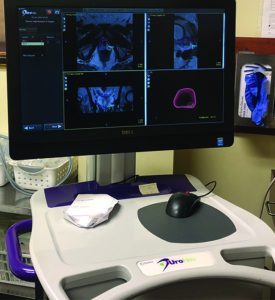Gulf Coast Urology has a better way to detect and treat your cancer
 Over the last thirty years, the way most medical practitioners check for prostate cancer hasn’t changed very much, and unfortunately, this has led to higher statistics of men being underdiagnosed. There are approximately 2.9 million men in the U.S diagnosed with prostate cancer. Other than skin cancer, prostate cancer is the leading malignancy in men.
Over the last thirty years, the way most medical practitioners check for prostate cancer hasn’t changed very much, and unfortunately, this has led to higher statistics of men being underdiagnosed. There are approximately 2.9 million men in the U.S diagnosed with prostate cancer. Other than skin cancer, prostate cancer is the leading malignancy in men.
The prostate gland is a tiny plum sized organ that lies just beneath the bladder; the urethra runs through the prostate releasing urine from the bladder. As men age, it can become enlarged and cancerous. It is often referred to as a silent killer, as it rarely shows signs or symptoms until it has developed maturely and even metastasized into other areas of the body. This year alone, it will take over 27,000 men’s lives. But it doesn’t have to be this way.
Standard methods often miss prostate cancer
Traditional rectal exams miss the smaller tumors that are progressively growing, and although the level of a man’s PSA (prostate-specific antigen) is an essential marker in detecting issues with the prostate, unfortunately, this test alone is not always detailed enough. In some cases, men with completely normal PSA levels will regrettably have prostate cancer. And on the contrary, high PSA levels can sometimes coincide with a healthy normal prostate. For men in their mid to later life, it is beneficial to have additional forms of diagnostic tests.
Through the years there have been many different variants of testing and imaging for the prostate. One of those is ultrasound. Conversely, with ultrasound many times the transrectal imaging is not clearly visible. In some cases, cancer and lesions can go undetected. If a transrectal biopsy is being performed with ultrasound, it sometimes is done blindly, meaning that the physician may inadvertently miss the actual cancer within the prostate.
Advanced technology for diagnosis and treatment
Fortunately, there is a better test. The most advanced MRI (Magnetic Resonance imaging) is done with an MRI fusion biopsy. This technology blends ultrasound and MRI guided biopsy to assure correct location and biopsy take place. The unique MRI unit, shows detailed prostate anatomy, revealing the tiniest lesions that would otherwise go unnoticed, enabling the physicians to visualize the
prostate like never before. With the MRI Fusion Biopsy, physicians are also able to map out intricate treatment options for each patient individually on a case-by-case basis.
This year alone, over 700,000 men will undergo repeat prostate biopsies, with MRI Fusion, the difference in the complex details is beyond comparison, and that’s ideal for both the patient and the physician. In addition to the scientific advancements in locating and treating prostate cancer, the comfort and reduced anxiety to the patient is also advantageous.
URONAV in partnership with 21st Century Oncology is the company Gulf Coast Urology uses that provides a machine that allows MRI fusion Biopsy image to be merged in real time to the ultrasound on the day of the biopsy. This targets a lesion with immense accuracy that can then be biopsied.
The key to the best outcome when dealing with the prostate is to get a proper diagnosis early. The MRI Fusion Biopsy through URONAV is the best chance men have for detailed imaging, early detection, and a healthy life. This technology has helped increase the accuracy of biopsy upwards of 80-90%.
Urology Experts
Gulf Coast Urology, a division of 21st Century Oncology, Port Charlotte, has been performing the URONAV fusion biopsy method in their office for over a year now, in addition to using MRI technology for the past 4-5 years. Patients seem very satisfied in that it helps to rule out cancer that may have previously been missed with traditional methods of diagnosis.
At Gulf Coast Urology, you will receive work with experienced medical professionals and the most advanced radiation therapy technology combined into the best possible cancer treatment. To find out more, please call (941) 625-1550.
Dr. Eric Coronato received his degree from New York College of Osteopathic Medicine, completed his internship in Massachusetts and his Urology residency at Albert Einstein Medical Center in Philadelphia and has been practicing in Florida since 2010.
Dr. Coronato is affiliated with multiple hospitals in the area, including Fawcett Hospital, Englewood Hospital, and Bayfront Health Park (Port Charlotte and Punta Gorda). He is also affiliated with Gulf Point Surgery Center.
Dr. Coronato’s areas of special interest are urologic oncology, kidney stone disease, prostate hypertrophy and urinary incontinence. Dr. Coronato sees patients at Port Charlotte and Punta Gorda offices.
GulfCoast Urology
21260 Olean Boulevard
Suite 202A
Port Charlotte FL 33952
941-625-1550
www.gcurology21c.com









